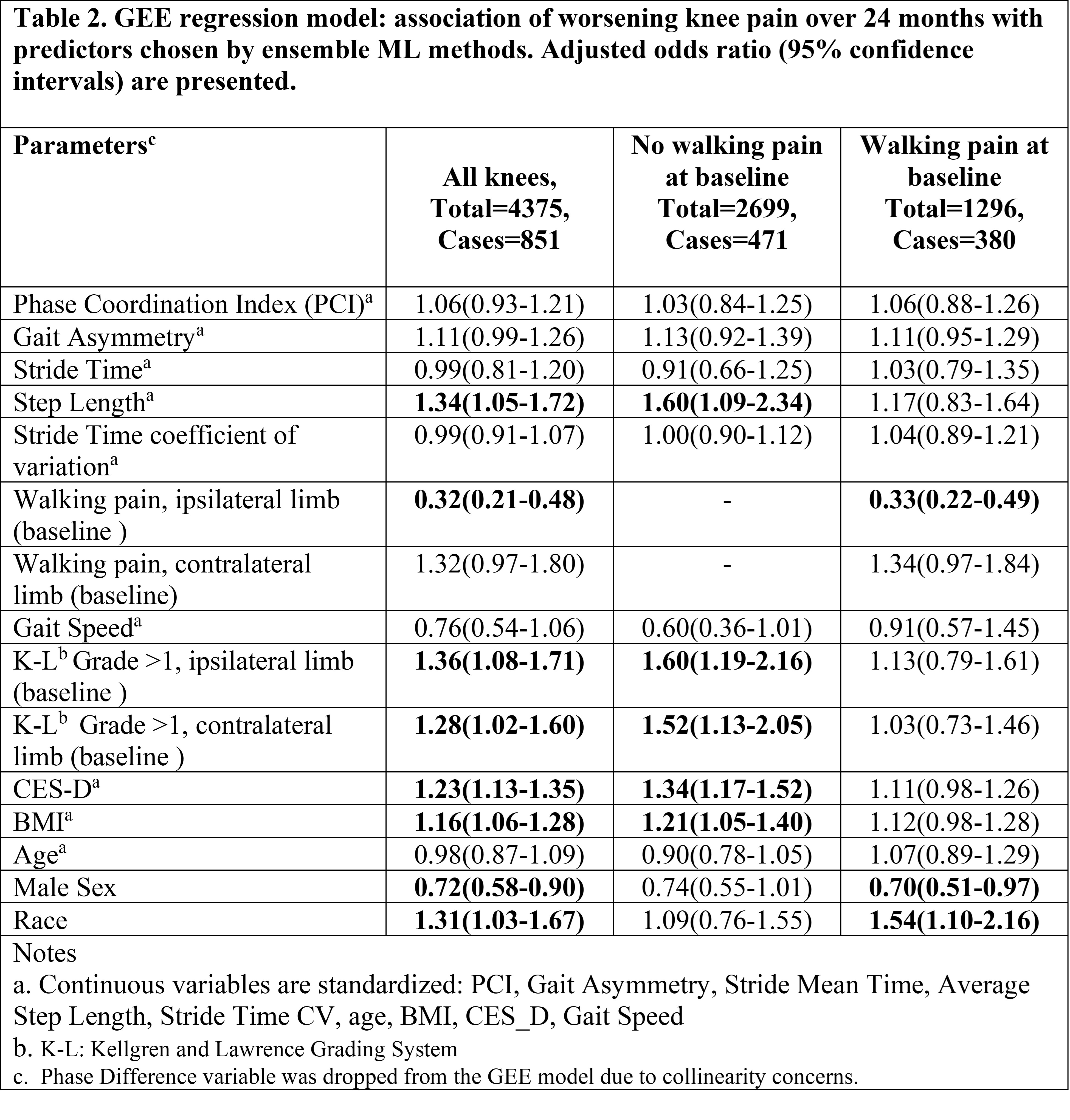Session Information
Date: Tuesday, November 9, 2021
Title: Abstracts: Orthopedics, Low Back Pain, & Rehabilitation (1901–1904)
Session Type: Abstract Session
Session Time: 10:45AM-11:00AM
Background/Purpose: Altered gait is related to structural worsening of knee osteoarthritis (OA). However, it is not known if altered gait is associated with increased risk of pain worsening over time. We applied machine learning approaches to gait data collected in a large epidemiological cohort to identify markers of gait alterations in people with worsening knee pain over 2 years.
Methods: The MultiCenter Osteoarthritis (MOST) study includes participants age 45-90 with, or at risk for, knee OA. Participants were categorized by presence of worsening knee pain over 2-years, defined as MCID increase in WOMAC pain (2+ points on 0-20 point scale). Gait was assessed at the 144 month visit using inertial sensors (OPAL, APDM, Portland, OR) worn on the trunk and both ankles during a 20-meter walk test in which participants walked at a self-selected pace.
We used an ensemble machine learning technique (“super learning”) that uses multiple algorithms (Table 1 footnote) to improve outcome classification. All gait variables (both legs, Table 1 footnote), presence of pain during walking and K-L grade of each knee, age, BMI, depressive symptoms (CES-D), and sex were included as predictors. Data were randomly split into 70% training and 30% test sets; the data split and model training and testing were repeated 100 times. We used a variable importance measure (VIM) statistic to identify the top 10 variables that most frequently contributed to the prediction of worsening knee pain. A Generalized Estimating Equation (GEE) model accounting for correlated outcomes (2 knees/person) was used to evaluate the association of “important” variables with worsening knee pain over 2 years. Potential confounders age, BMI, sex, baseline walking pain and K-L status were included. Analyses stratified by baseline walking pain are also presented.
Results: Our sample included 4464 knees for 2232 participants (mean age 63.6 [SD: 10.5] years, 57% female). 19.5% of knees had worsening pain over 2 years. Top contributing variables from ensemble machine learning process (AUC=0.69) are shown in Table 1.
In a GEE model (Table 2), longer step length was associated with increased likelihood of worsening pain over 2 years. However, when stratified by baseline pain, the association of step length and pain worsening was only significant in people without pain at baseline.
Conclusion: Our results suggest higher step length was associated with worsening knee pain over 2 years in individuals with or at risk of knee OA who do not have pain during walking at baseline. Walking with longer step length is associated with greater knee joint loading and shortening step length has been recommended as a gait intervention to reduce knee joint loading in people with knee OA. Our findings, using gait data from a large cohort and using machine learning to agnostically identify important gait variables, provide further support for this recommendation.
To cite this abstract in AMA style:
Bacon K, Felson D, Jafarzadeh S, Kolachalama V, Hausdorff J, Gazit E, Segal N, Lewis C, Nevitt M, Kumar D. Gait Alterations Associated with Worsening Knee Pain over 2 Years: A Machine-learning Approach in the MultiCenter Osteoarthritis Study [abstract]. Arthritis Rheumatol. 2021; 73 (suppl 9). https://acrabstracts.org/abstract/gait-alterations-associated-with-worsening-knee-pain-over-2-years-a-machine-learning-approach-in-the-multicenter-osteoarthritis-study/. Accessed .« Back to ACR Convergence 2021
ACR Meeting Abstracts - https://acrabstracts.org/abstract/gait-alterations-associated-with-worsening-knee-pain-over-2-years-a-machine-learning-approach-in-the-multicenter-osteoarthritis-study/


